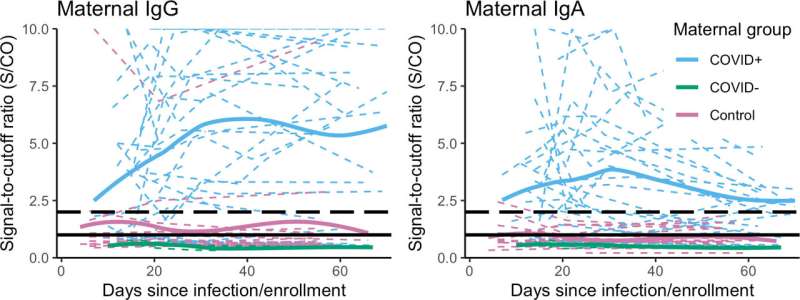Infants less likely to contract COVID, develop severe symptoms than other household caregivers

Infants whose mothers test positive for COVID-19 tend to develop less-severe symptoms than their parents, if they become infected with the virus at all.
In one of the first studies to explore how COVID-19 specifically affects older infants, researchers from the University of Washington and at institutions at four other locations in the Western and Southern U.S. found that the number of infected people in a household was the factor most closely linked with the infant's likelihood of being infected.
"The focus on infants early in the pandemic was about possible transmission risks during pregnancy, birth or through breastfeeding, but there were other questions about the risks in the household to infants and other children when caregivers are sick," said Melanie Martin, assistant professor of anthropology at the UW and the first author of the study, which published Oct. 12 in Frontiers in Immunology.
"Infants are in the most contact, and very close contact, with their caregiver than with any other family members. And so we asked, how much are infants at risk, and how do you protect children when they are sick?"
The study analyzed surveys and antibody results (taken from pin-prick blood samples) of 46 pairs of COVID-positive mothers and their infants for two months following maternal infection. Infants were at least 1 month old, and COVID-positive mothers were enrolled in the study within days, sometimes hours, of receiving their positive PCR test results.
The researchers also recruited a comparative group of 11 COVID-negative mothers, who tested negative after exposure or symptoms, and a control group of 26 mothers with no known COVID exposures or symptoms.
In all, about half of the infants of COVID-positive mothers developed symptoms or antibodies indicative of COVID-19 infection. The rates of infection and symptoms in those infants were similar to those of other household children, but lower than for fathers and other household adults.
None of the COVID-negative mothers or their infants tested positive for SARS-CoV-2 antibodies, including one infant who tested PCR positive. While nearly half of the mothers in the control group had antibodies targeting SARS-CoV-2, likely signaling a previous infection they were unaware of, none of their infants did.
Infant age and maternal symptoms were not associated with risk of infection among infants of COVID-positive mothers, but families with greater numbers of infected family members were more likely to have infants who had tested positive.
"Infant infection was mostly related to household infection. The risks to infants were not stemming solely from their mothers; there was just transmission in the household," Martin said.
Researchers noted that the study was limited by its overall sample size, and that data relied on participants' own reports and collection of blood samples. With some COVID symptoms nearly impossible to assess among infants—headache, loss of smell or taste—and others, such as a runny nose, common outside of COVID, researchers noted that parental perception of symptoms could vary.
The study was conducted from June 2020 to March 2021, before vaccines were widely available, though one COVID-positive mother and some of the mothers in the control group had received a first dose during the study. The researchers removed the samples taken after vaccination from their analyses, but observed antibody responses following vaccination in those mothers.
Nearly all infants in the study were breastfeeding. While the researchers weren't able to directly test for protective effects of breastfeeding against infection, the breastfed infants who had been exposed to COVID did not appear to be at higher risk of infection than other children and adults in the household. In a 2021 Frontiers in Immunology paper, the researchers found that none of the milk collected from the infected mothers contained SARS-CoV-2 virus. Most milk samples contained antibodies to the virus for up to two months following infection.
"Overall, the risks to COVID-19 exposed infants in this study were minimal. The findings support recommendations for infected mothers and other caregivers to continue infant care and feeding as usual, including breastfeeding," Martin said.
More information: Melanie A. Martin et al, SARS-CoV-2 specific antibody trajectories in mothers and infants over two months following maternal infection, Frontiers in Immunology (2022). DOI: 10.3389/fimmu.2022.1015002
Ryan M. Pace et al, Milk From Women Diagnosed With COVID-19 Does Not Contain SARS-CoV-2 RNA but Has Persistent Levels of SARS-CoV-2-Specific IgA Antibodies, Frontiers in Immunology (2021). DOI: 10.3389/fimmu.2021.801797




















